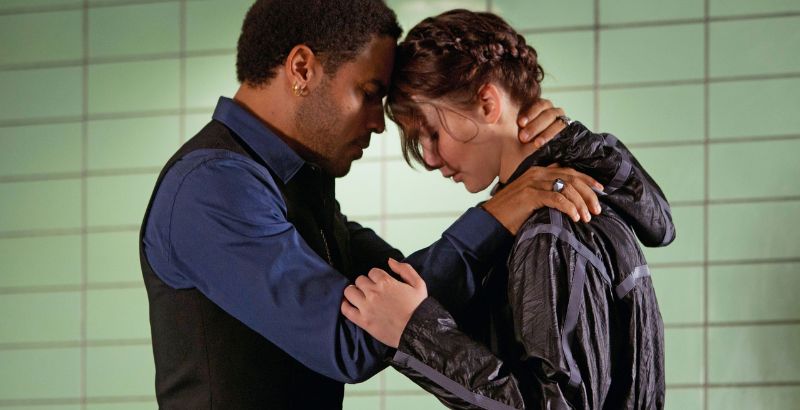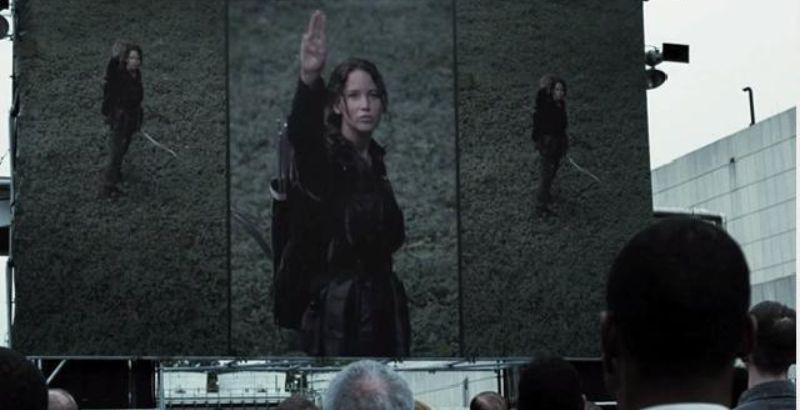
The Hunger Games is written by Suzanne Collins, published through Scholastic, and released in 2008. I don’t recall reading it when it was coming out. Instead, the 2012 film put the book on my radar. I read it. I remember liking it. I saw the movies and felt generally indifferent, definitely liking the books a lot more. When I finally finished the last book of the series, Mockingjay, it made me love the series, with what I thought was a great conclusion for the trilogy. Ever since those days, I hadn’t thought about any of these books until I saw that a prequel series was underway called The Ballad of Songbirds and Snakes. Filled with nostalgia, I reread The Hunger Games.
Collins immediately introduces readers to a world filled with tragedy through the lens of protagonist Katniss Everdeen. She guides us through her day to day existence in District 12, a place frothing with poverty, on the morning of the Reaping. There used to be a District 13, however, they rebelled against the authoritarian Capitol that resulted in bombs destroying them. As a way to make sure no other district follows suit, the Capitol hosts the Hunger Games. It is a battle royal where two children, one boy, and one girl, from each district, between the ages of 13-18, are picked to enter the life-or-death competition. The Reaping is the day where tributes, as they are called, are chosen. At a brisk pace, we are tuned in to how the ruins of America were turned into the country of Panem. At the very center is the affluent Capitol who is surrounded by 12 other districts.
Collins characterizes Katniss as an indifferent, stoic protagonist at the start of the book. When she speaks with her best friend Gale, he critiques the ethics of the Hunger Games. Katniss tells him to quit being so adamant about it because they are powerless to their government. Katniss chooses to put on a brave face and deal with her life as it is, stating that why should she talk about it if she can’t do anything to change it. She is built to survive and it is evident from her backstory. At the age of 16, she has already endured so much suffering. Her father died in a coal mine explosion, leaving Katniss to care for her mother and younger sister Prim. Her mother fell into a depressive state and wouldn’t take care of herself or her children.
Katniss became the head of the house at 11. She illegally sneaks past the borders of her district to hunt animals for meat. An action that could cost her her life. However, she attempts this risky behavior because her mother won’t work. So, she has to keep them all alive. Katniss is 11. Reading this made my heart hurt. Being 15, I did not understand the depths of how politics affects people nor the emotional maturity to understand the terror of life in District 12. Fending for herself, risking death to feed her mother and sister, having to emotionally cut herself off from her mother to protect herself, growing into a cold person, loving only her sister, Katniss Everdeen is a character that Collins crafts expertly. Not only do I feel empathetic towards her strife, but I hurt for her too.

It is no surprise that Katniss volunteers herself as tribute when Capitol escort, Effie Trinket, calls out Prim’s name for the Hunger Games. Katniss only has room in her heart to protect and love Prim, meaning she would rather die than watch her 12-year-old sister fall victim to the viciousness of the government. From there, the pacing of The Hunger Games leaves no room to breathe, in the best way. We meet the boy tribute for District 12, Peeta Mellark. He is characterized as a sweet, charming, and loving boy. The exact opposite of Katniss. As a systematic tool to harm its citizens, the kids are whisked away and only have one hour to say their goodbyes. Katniss is aware of how the games are played and won’t let herself cry or display any emotion so the press doesn’t portray her as a weakling. Her understanding of this televised game makes her assess how she will be perceived by the media from here on out. This is where true core of this book starts to form.
Peeta and Katniss are assigned a mentor to help guide them through the protocols of the Games. Theirs is the local drunk, Haymitch Abernathy. Years ago, he was a past victor of the Hunger Games. However, it is hard to believe considering that he fills his time by drowning himself in a bottle. Collins does not even mention how Haymitch processed how the games or how it affected him. However, Collins cleverly keys readers into the fact that his alcoholism is a by-product of his PTSD of winning.
I noticed that as I read this book that Collins rarely gives anyone but her main protagonists’ backstories. Instead, she chooses to define their actions and interactions with Katniss and Peeta. The people they meet in the Capitol are superfluous in their decadence. They always have to comment on how Katniss and Peeta are more civilized than past tributes from district 12. They make mention how they have a lot of work to do on Katniss in prep for her TV appearances. Characters that treat Katniss with humanity and civility are allies. However, that is only one person, her stylist Cinna who she likes. As I read through these chapters of Katniss being forced to become an object of affection to all the viewers of Panem. The focus of Collins’s political commentary is on classism and rebellion.

Cinna transforms Katniss from a poor, District 12 resident to the bright spectacle that is Katniss, The Girl on Fire. The Capitol does not want the reality of how people outside of the affluent districts of 1-3 life. Each tribute is stripped of any sense of their poverty by throwing expensive outfits on each of their tributes. There is no room to view them as dirty, uncivilized, or rebellious because The Capitol wants to manipulate the masses with the Hunger Games. It’s reality TV where children are forced to slaughter one another and it is everyone’s favorite pastime. I felt sick to my stomach. Reading about how Katniss felt anxiety on stage knowing she didn’t look like herself was stressful. Collins’s sense of invoking mood from Katniss’s voice is a big strength of the book. It felt mortifying that Katniss is only experiencing privilege on her theoretical death bed. This is further exemplified as we transition to them entering training.
Collins describes the privileged children of Districts 1-3 as Careers. This is the notion that these children are bred from birth to be killing machines. Instead of the Hunger Games being a terrifying death sentence, they find pride in bringing their District honor with their victory. This sense of hyper-nationalism derives from the fact that they don’t have to worry about dying of starvation or the clothes on their backs. They can feel a sense of honor for their country of Panem because they do not directly feel the effects of the countries oppression of the lower class. This is never explicitly stated in the book but you can gather it by how Katniss talks about them. Even Peeta divulges that he doesn’t want to die by the hands of the Capitol and give in so easily. They feel trapped by a system created to not start another rebellion. Katniss at the beginning of the book feels no sense of urgency to upstage or think much of the classism that gives the Capitol power, but it is starting to stir in her.
It is within the Hunger Games that Katniss’ rebellious nature is brought out. At that point, she has no choice but too. She has to bear witness to what this battle royal does to other children besides herself. It’s sickening. Collins does not shy back from displaying violence in the arena. It feels real but never exploitative or gratuitous. However, for being a YA book, it is brutal. Maybe it’s my emotional maturity but each death, regardless of them being an enemy or an ally to Katniss, felt very tragic. I think now that I am distanced in age, The Hunger Games no longer feels like the coolest, hippest book ever, it feels like a scary look into a believable dystopian. The most excruciating part was at the expense of a younger character’s death.
Tears rolled down my face as I read Katniss experiencing grief, the most emotional she’s been so far, and then anger. It’s with this character’s death that Katniss refuses to let the Capitol continue to get away with this. Katniss does a serious of actions that she purposefully does to defy the Government. The pacing is immaculate and I never felt as if the book lagged. It felt as if the author purposefully set up the 3rd act to be a whirlwind of a finale with Katniss’s defiance at its core.

While a lot of aspects of The Hunger Games showcase Collins’ writing skills, there is one weakness in this book. The underlying idea of a love triangle between Katniss, Peeta, and Gale. As a way to market Katniss as appealing to the general audience, Haymitch bound her and Peeta together as doomed star-crossed lovers. As mentioned before, her characterization leaves little room for her to care for another so viscerally. She is angry that this is even necessary yet does it on the off chance that it will elongate her life. The writing between the growth of Peeta and Katniss’s relationship feels organic. It is not a stereotypical falling head over heals romance. It is a doctored calculation. However, Katniss does grow to be quite fond of Peeta and allows herself to care for a boy who’s life has been entangled with hers.
But, Katniss has one other man in her life. Her best friend from district 12 is named Gale. At the start of the book, it is made abundantly clear that Gale is not a romantic interest to Katniss whatsoever. They have a mutual trust of one another that is written with the notions of Gale being more of a big brother to Katniss than a partner. However, as the games continue. Katniss starts to confuse her feelings for Peeta and Gale.
She wonders why she feels guilty, only on occasion, as to why she worries what Gale thinks of her when she and Peeta display any form of intimacy. It feels so out of place for Katniss, so rooted and sure of her feelings to all of a sudden be hinted to be romantically interested in Gale. This directly contradicts their established relationship dynamic with not enough organic writing to justify this 180. I distinctly remember at the height of the popularity of this book, love triangles were a huge trend in YA fiction. I would not be surprised if adding romantic tension to set up a love-triangle in future books was an editorial move.
Regardless of the romance aspect, The Hunger Games shocked me. I have reread a couple of YA favorites this year already and I have been thoroughly disappointed at how much they have not aged well. That is not the case with this book. I was taken aback by how quickly I wanted to devour this title. I was struck by the maturity and tightness of this fast-paced narrative. A smart and ageless commentary on the terrifying classism instilled by a ruthless, authoritarian government, The Hunger Games remains a book that can be reread with ease with a rebellious protagonist you cannot help but root for.
